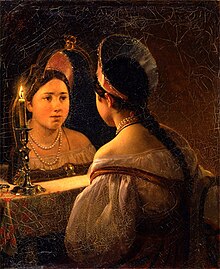A rhyme is a repetition of similar sounds in the final stressed syllables and any following syllables of two or more words. Most often, this kind of rhyming is consciously used for a musical or aesthetic effect in the final position of lines within poems or songs. More broadly, a rhyme may also variously refer to other types of similar sounds near the ends of two or more words. Furthermore, the word rhyme has come to be sometimes used as a shorthand term for any brief poem, such as a nursery rhyme or Balliol rhyme.
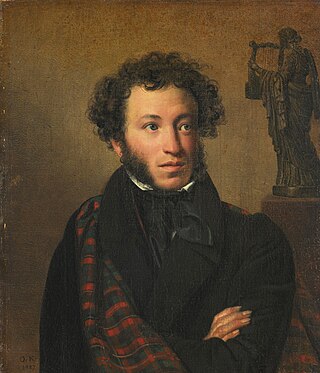
Александер Сергеевич Пушкин was a Russian poet, playwright, and novelist of the Romantic era. He is considered by many to be the greatest Russian poet, as well as the founder of modern Russian literature.

Eugene Onegin, A Novel in Verse is a novel in verse written by Alexander Pushkin. Onegin is considered a classic of Russian literature, and its eponymous protagonist has served as the model for a number of Russian literary heroes. It was published in serial form between 1825 and 1832. The first complete edition was published in 1833, and the currently accepted version is based on the 1837 publication.
A rhyme scheme is the pattern of rhymes at the end of each line of a poem or song. It is usually referred to by using letters to indicate which lines rhyme; lines designated with the same letter all rhyme with each other.

Romantic poetry is the poetry of the Romantic era, an artistic, literary, musical and intellectual movement that originated in Europe towards the end of the 18th century. It involved a reaction against prevailing Enlightenment ideas of the 18th century, and lasted approximately from 1800 to 1850. Romantic poets rebelled against the style of poetry from the eighteenth century which was based around epics, odes, satires, elegies, epistles and songs.
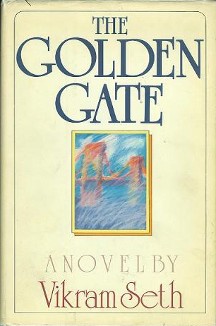
The Golden Gate (1986) is the first novel by poet and novelist Vikram Seth. The work is a novel in verse composed of 590 Onegin stanzas. It was inspired by Charles Johnston's translation of Pushkin's Eugene Onegin.

Vasily Andreyevich Zhukovsky was the foremost Russian poet of the 1810s and a leading figure in Russian literature in the first half of the 19th century. He held a high position at the Romanov court as tutor to the Grand Duchess Alexandra Feodorovna and later to her son, the future Tsar-Liberator Alexander II.
Onegin stanza, sometimes "Pushkin sonnet", refers to the verse form popularized by the Russian poet Alexander Pushkin through his 1825–1832 novel in verse Eugene Onegin. The work was mostly written in verses of iambic tetrameter with the rhyme scheme aBaBccDDeFFeGG, where the lowercase letters represent feminine rhymes and the uppercase representing masculine rhymes. For example, here is the first stanza of Onegin as rendered into English by Charles Johnston:

Ippolit Fyodorovich Bogdanovich was a Russian classicist and rococo author of light poetry, best known for his long poem Dushenka (1778).

A verse novel is a type of narrative poetry in which a novel-length narrative is told through the medium of poetry rather than prose. Either simple or complex stanzaic verse-forms may be used, but there is usually a large cast, multiple voices, dialogue, narration, description, and action in a novelistic manner.

This glossary of literary terms is a list of definitions of terms and concepts used in the discussion, classification, analysis, and criticism of all types of literature, such as poetry, novels, and picture books, as well as of grammar, syntax, and language techniques. For a more complete glossary of terms relating to poetry in particular, see Glossary of poetry terms.

The book Notes on Prosody by author Vladimir Nabokov compares differences in iambic verse in the English and Russian languages, and highlights the effect of relative word length in the two languages on rhythm. Nabokov also proposes an approach for scanning patterns of accent which interact with syllabic stress in iambic verse. Originally Appendix 2 to his Commentary accompanying his translation of Aleksandr Pushkin's Eugene Onegin, Notes on Prosody was released separately in book form.
This is a glossary of poetry terms.
The following outline is provided as an overview of and introduction to poetry:
James E. Falen is a professor emeritus of Russian at the University of Tennessee. He published a translation of Eugene Onegin by Alexander Pushkin in 1990 which was also influenced by Nabokov's translation, but preserved the Onegin stanzas (ISBN 0809316307). This translation is considered to be the most faithful one to Pushkin's spirit according to Russian critics and translators.

Mikhail Leonovich Gasparov was a Russian philologist and translator, renowned for his studies in classical philology and the history of versification, and a member of the informal Tartu-Moscow Semiotic School. He graduated from Moscow State University in 1957 and worked at the Gorky Institute of World Literature, the Russian State University for the Humanities, and the Russian Language Institute in Moscow. In 1992 Gasparov was elected a full member of the Russian Academy of Science.
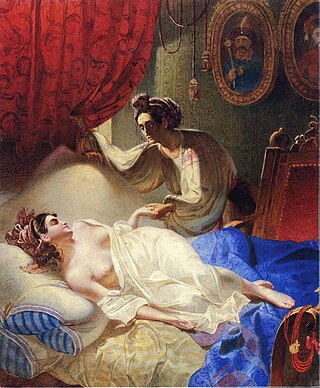
Poltava is a narrative poem written by Aleksandr Pushkin in 1828–29 about the involvement of the Ukrainian Cossack hetman Ivan Mazepa in the 1709 Battle of Poltava between Sweden and Russia. The poem intertwines a love plot between Mazepa and Maria with an account of Mazepa's betrayal of Tsar Peter I and Peter's victory in battle. Although often considered one of Pushkin's lesser works and critiqued as unabashedly imperialistic, a number of critics have praised the poem for its depth of characterization and its ability to synthesize disparate genres. The poem inspired Tchaikovsky's 1884 opera Mazeppa.

Alexander Fyodorovich Voeykov was a Russian poet, translator, literary historian and journalist, best known for his satirical poems of 1814-1820.
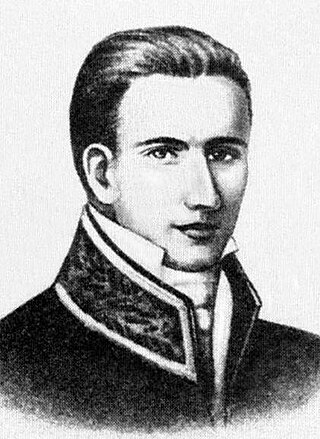
Levko Borovykovsky ([Borovykovs'kyj] was a Ukrainian romantic poet, writer, translator, and folklorist.

Pyotr Alexandrovich Yefremov was a Russian literary historian, publisher, editor and essayist whose works were published regularly by Sovremennik, Otechestvennye Zapiski, Russky Arkhiv, Russkaya Starina, Istorichesky Vestnik, newspapers Golos, Novoye Vremya, Russkiye Vedomosti. In 1864-1865 he edited the Knizhny Vestnik magazine. Praised as one of the most competent literary scholars of the 19th century, Pyotr Yefremov compiled, edited and published the series of The Works of: Denis Fonvizin (1866), Valerian Maykov (1867), Antiochus Kantemir (1867-1868), Vladimir Lukin (1868), Bogdan Yelchaninov (1868), Alexander Radishchev, Kondraty Ryleyev, Mikhail Lermontov, Vasily Zhukovsky, Alexander Pushkin, Alexander Polezhayev (1889). He is credited with having discovered, published and written analytical essays on numerous hitherto unknown autographs by classics like Pushkin, Ryleyev, Lermontov, Radishchev, Fonvizin, Zhukovsky.
